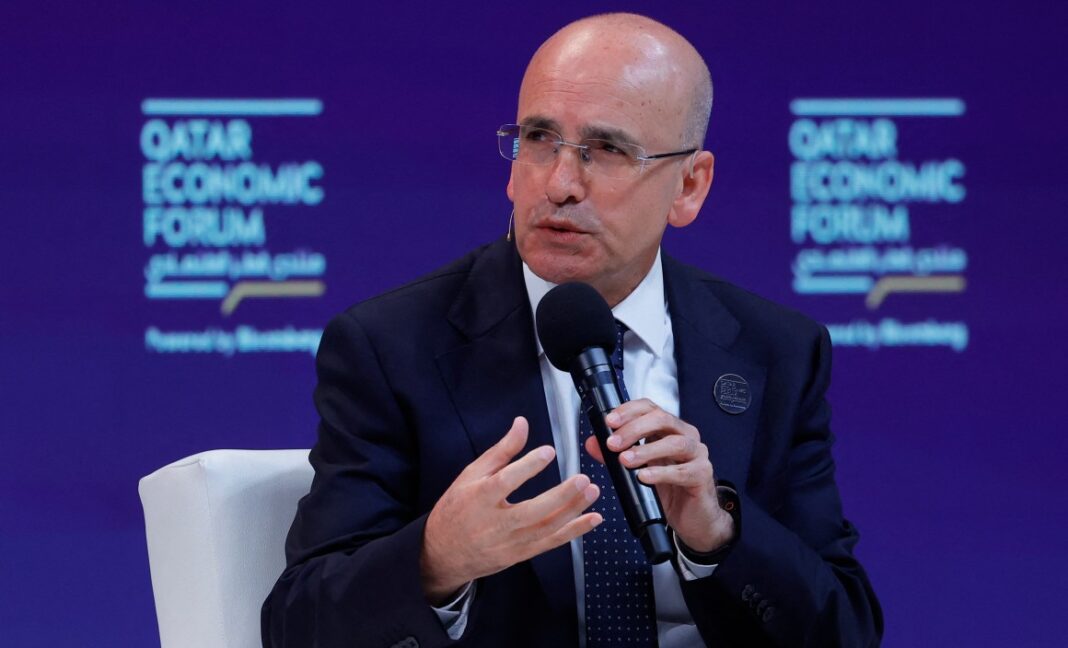The pro-government Turkish Yeni Şafak newspaper published a sharp criticism of Turkey’s current economic policies, indirectly targeting Treasury and Finance Minister Mehmet Şimşek while praising the approach taken under his predecessor, Nureddin Nebati, in its Monday edition.
In a report titled, “Interest rates up, lira down, inflation unabated: production lower, industry stalls,” the newspaper refrained from naming Şimşek directly. However, it pointed to a “sharp policy shift in economic management two years ago,” a clear reference to Şimşek’s appointment in June 2023.

President Recep Tayyip Erdoğan named Şimşek to his cabinet following the general election in May 2023 to tackle Turkey’s cost-of-living crisis and other problems, in a clear sign that his newly elected government would return to more orthodox economic policies after refusing to increase interest rates for a long time.
Erdoğan has long argued that high interest rates cause inflation, a theory that runs against mainstream economic theory.
The new economic team, under Şimşek, initially had the central bank implement a series of interest rate hikes to combat inflation. After maintaining the interest rate at 50 percent for several months, the bank embarked on a gradual cycle of rate cuts until April 17, when it raised its key interest rate by 3.5 percentage points.
The monetary policy committee “has decided to raise the policy rate from 42.5 percent to 46 percent,” the bank said in a statement.
The Yeni Şafak article blamed the current orthodox economic approach, characterized by high interest rates, as a key factor behind slowing industrial activity and weakening growth. The daily described the current situation as a “rational collapse in the economy,” a play on Şimşek’s inaugural pledge to restore “rational policies.”
Turkey has experienced double-digit inflation since 2019, making life increasingly expensive for millions of people, notably hitting the cost of education, housing, healthcare, food and transportation. The annual inflation rate, which peaked at 85.5 percent in October 2022, has declined over the years and currently stands at around 38 percent, according to official data. It stood at around 60 percent when Şimşek took over the ministry in June 2023.
Şimşek was highly regarded by financial markets when he served as finance minister and then as deputy prime minister between 2009 and 2018. There were high expectations from him to put the economy on track, but his term has been shadowed with constant claims about his plans to resign, which he has so far denied.
Praise for Nebati era
While not mentioning Nebati by name, Yeni Şafak lauded the pre-Şimşek period, during which Nebati served as finance minister, between December 2021 to June 2023. The report argued that despite the challenges of the COVID-19 pandemic, the war in Ukraine, two devastating earthquakes in Turkey’s south in February 2023 and the May 2023 general election, Turkey had managed to grow through increased production, exports and employment, thanks to low interest rates.
The paper contrasted that with the present, claiming that for the past two years Turkey has been “struggling with high interest rates.”
“The orthodox monetary policy, centered on high interest rates and seen as the sole obstacle to economic progress, has not only failed to curb inflation but also placed a heavy burden on the country,” it said.
Pattern of editorial intervention
Yeni Şafak has been increasingly vocal in its criticism of Şimşek and the central bank, particularly since last month’s interest rate hike. The paper previously ran front-page stories such as “Inflation at 38 percent despite high interest rates” and accused Şimşek and central bank officials of “sabotaging the economy” following the rate hike in April.
The newspaper’s editorial stance has reportedly influenced government decisions in the past. In March 2021, after then-Central Bank governor Naci Ağbal raised the interest rate from 17 to 19 percent, Yeni Şafak published a headline reading “Who ordered this operation?” Ağbal was removed shortly afterward and replaced by Yeni Şafak columnist and economist Şahap Kavcıoğlu.
Similarly, after Hafize Gaye Erkan stepped down as central bank governor in February 2024, her successor, Fatih Karahan, also faced criticism from the paper. His inflation forecasts were ridiculed under the headline “Raised Forecast, Blamed the Public.”

